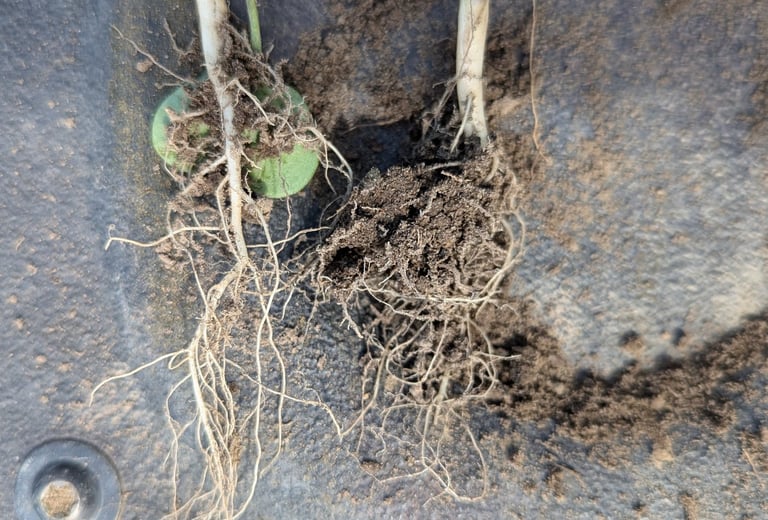Enhancing Water Management and Soil Health through Regenerative Farming
SOIL PHYSICSCOVER CROPPINGSOIL FERTILITYREGEN AG


Discover how regenerative farming strategies such as cover cropping, no-till farming, and agroforestry improve water management, enhance soil health, and boost crop productivity. This article explores sustainable practices that reduce soil erosion, increase water retention, and contribute to climate change mitigation. Learn how effective water management not only strengthens farm resilience but also supports global food security and environmental sustainability.
Water Management Strategies in Regenerative Farming
Water management is a critical component of regenerative farming, directly influencing soil health, crop productivity, and environmental sustainability. Effective water management strategies help mitigate the impacts of climate change, prevent soil erosion, and improve water retention in soils, which are all essential for long-term agricultural success. This article explores various water management strategies in regenerative farming, supported by insights and resources from Canada, the USA, and Australia.
The Importance of Water Management in Regenerative Farming
Water is a finite resource, and its efficient use is paramount in agriculture. Regenerative farming practices focus on maximizing water use efficiency, conserving water resources, and enhancing the natural water cycle within the farming system.
1. Soil Health and Water Retention: Healthy soils have a higher organic matter content, which improves their ability to retain water. Practices such as cover cropping and reduced tillage increase organic matter in the soil, enhancing water retention and reducing the need for irrigation. For more information on improving soil health and water retention, refer to the Ontario Provincial Soil Strategy and Agriculture and Agri-Food Canada.
2. Preventing Soil Erosion: Soil erosion is a significant threat to agricultural productivity and water quality. Techniques like no-till farming, contour plowing, and maintaining vegetative cover help protect the soil from erosion by reducing runoff and promoting water infiltration. The USDA NRCS and NSW Department of Primary Industries provide valuable guidance on erosion control practices.
3. Enhancing the Water Cycle: Regenerative farming practices aim to enhance the natural water cycle by promoting water infiltration and reducing runoff. Agroforestry, cover cropping, and maintaining riparian buffers are effective strategies that help maintain healthy water cycles on farms. Learn more about water cycle management from the International Water Management Institute (IWMI) and Regen Farmer.
Water Management Strategies in Regenerative Farming
Implementing effective water management strategies is essential for creating resilient and sustainable farming systems. Below are some of the key strategies used in regenerative farming:
1. Cover Cropping: Cover crops play a crucial role in water management by protecting the soil surface, reducing evaporation, and enhancing water infiltration. They also help maintain soil moisture during dry periods, reducing the need for irrigation. Resources on cover cropping can be found on Farmers.gov and the Soil Conservation Council of Canada.
2. No-Till Farming: No-till farming minimizes soil disturbance, which helps retain soil moisture and reduces erosion. This practice also enhances the soil's ability to absorb and store water, making it more resilient to drought and heavy rainfall. For more information on no-till farming, visit No-Till Farmer and NSW Department of Primary Industries.
3. Agroforestry and Silvopasture: Integrating trees and shrubs into agricultural systems through agroforestry and silvopasture practices helps improve water retention and reduces runoff. Trees provide shade, reduce evaporation, and enhance soil structure, which improves water infiltration. For more insights on these practices, explore the Savory Institute’s Land to Market program and Alberta Sustainable Agriculture.
4. Mulching and Organic Amendments: Applying mulch to the soil surface helps retain moisture, reduce evaporation, and protect the soil from erosion. Organic amendments like compost and manure also improve soil structure, enhance water retention, and support microbial activity. Detailed information on mulching and organic amendments is available from the Organic Agriculture Centre of Canada and Regen Organic Certified.
5. Managed Grazing: Managed grazing practices, such as rotational grazing, help improve water infiltration and reduce runoff by maintaining healthy pasture cover. Livestock can be used strategically to manage vegetation, enhance soil health, and support the natural water cycle. For more on managed grazing, visit the Savory Institute.
Global Impacts of Effective Water Management
Effective water management in regenerative farming has far-reaching impacts, from improving farm productivity to mitigating climate change.
1. Climate Change Mitigation: Water management strategies that enhance soil health and increase organic matter also contribute to carbon sequestration, helping to mitigate climate change. Practices such as cover cropping and reduced tillage play a significant role in this process. For more on the relationship between water management and climate change, visit Project Drawdown and IWMI.
2. Improved Water Quality: By reducing runoff and preventing soil erosion, regenerative farming practices help maintain clean water supplies. These practices also reduce the need for chemical inputs, which can contaminate water sources. More information on water quality and regenerative practices can be found at Agriculture and Agri-Food Canada.
3. Enhanced Food Security: Effective water management strategies lead to healthier soils, more resilient crops, and increased agricultural productivity, all of which contribute to global food security. Sustainable water use ensures that farming systems can withstand the challenges posed by climate change and continue to produce food for future generations. Explore additional resources from the Ontario Provincial Soil Strategy and Regen Farmer.
Water management is a vital aspect of regenerative farming, directly influencing soil health, crop productivity, and environmental sustainability. By implementing strategies such as cover cropping, no-till farming, agroforestry, and managed grazing, farmers can optimize water use, improve soil health, and create resilient farming systems capable of withstanding climate challenges.
Interested in improving water management on your farm? Explore resources from the Ontario Provincial Soil Strategy, Agriculture and Agri-Food Canada, and USDA NRCS to start implementing effective water management strategies today!




